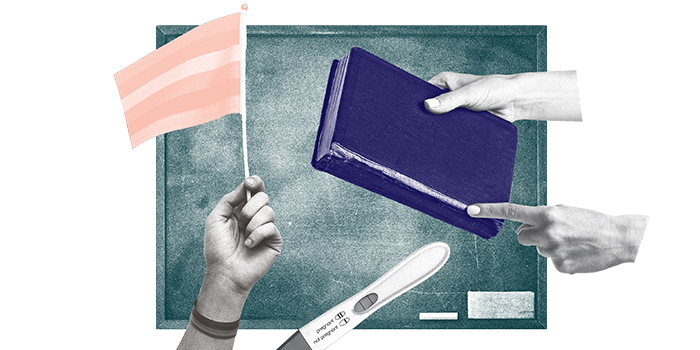Religious Liberty
The ACLU strives to safeguard the First Amendment’s guarantee of religious liberty by ensuring that laws and governmental practices neither promote religion nor interfere with its free exercise.

What you need to know
The Latest
-

Why Allowing Chaplains in Public Schools Harms Students
-


Chaplains, Civil Rights, and Faith Groups Oppose Public-School Chaplain Programs
-


ACLU Commends Biden Administration’s New Rules Protecting Religious Freedom for People Who Use Government-Funded Social Services
-


Muslim Americans Appeal to Ninth Circuit Over Illegal Religious Questioning by Border Officers
Explore More
What We're Focused On
-

Free Exercise of Religion
The ACLU works in courts, legislatures, and communities to defend and preserve the individual rights and liberties that the Constitution and the laws of the United States guarantee everyone in this country.
-

Government Promotion of Religion
The ACLU works in courts, legislatures, and communities to defend and preserve the individual rights and liberties that the Constitution and the laws of the United States guarantee everyone in this country.
-

Religion and Public Schools
The ACLU works in courts, legislatures, and communities to defend and preserve the individual rights and liberties that the Constitution and the laws of the United States guarantee everyone in this country.
-

Using Religion to Discriminate
The ACLU works in courts, legislatures, and communities to defend and preserve the individual rights and liberties that the Constitution and the laws of the United States guarantee everyone in this country.
What's at Stake
The First Amendment to the U.S. Constitution states that “Congress shall make no law respecting an establishment of religion, or prohibiting the free exercise thereof; or abridging the freedom of speech, or of the press; or the right of the people peaceably to assemble, and to petition the Government for a redress of grievances.” As enshrined in the First Amendment, religious freedom includes two complementary protections: the right to religious belief and expression and a guarantee that the government neither prefers religion over non-religion nor favors particular faiths over others. These dual protections work hand in hand, allowing religious liberty to thrive and safeguarding both religion and government from the undue influences of the other.
From our foundational work on behalf of conscientious objectors to our historic defense of John T. Scopes during the infamous “Scopes Monkey Trial” of 1925, the ACLU has been the national leader in the struggle for religious freedom. Building on that near-century of work, the ACLU employs an integrated strategy of litigation, public education, and advocacy to protect religious liberty.
The First Amendment to the U.S. Constitution states that “Congress shall make no law respecting an establishment of religion, or prohibiting the free exercise thereof; or abridging the freedom of speech, or of the press; or the right of the people peaceably to assemble, and to petition the Government for a redress of grievances.” As enshrined in the First Amendment, religious freedom includes two complementary protections: the right to religious belief and expression and a guarantee that the government neither prefers religion over non-religion nor favors particular faiths over others. These dual protections work hand in hand, allowing religious liberty to thrive and safeguarding both religion and government from the undue influences of the other.
From our foundational work on behalf of conscientious objectors to our historic defense of John T. Scopes during the infamous “Scopes Monkey Trial” of 1925, the ACLU has been the national leader in the struggle for religious freedom. Building on that near-century of work, the ACLU employs an integrated strategy of litigation, public education, and advocacy to protect religious liberty.